- Home
- Christie Golden
Warcraft Official Movie Novelization
Warcraft Official Movie Novelization Read online
Contents
Cover
Also by Christie Golden
Title Page
Copyright
Prologue
1
2
3
4
5
6
7
8
9
10
11
12
13
14
15
16
17
18
19
20
21
22
23
Epilogue
Acknowledgments
About the Author
Available Now from Titan Books
Also available from Titan Books and Christie Golden
WARCRAFT: DUROTAN
THE OFFICIAL MOVIE PREQUEL
Warcraft: The Official Movie Novelization
Print edition ISBN: 9781783295593
E-book edition ISBN: 9781783295616
Published by Titan Books
A division of Titan Publishing Group Ltd
144 Southwark St, London SE1 0UP
First edition: June 2016
10 9 8 7 6 5 4 3 2 1
© 2016 Legendary
© 2016 Blizzard Entertainment, Inc.
This is a work of fiction. Names, characters, places, and incidents either are the product of the author’s imagination or are used fictitiously, and any resemblance to actual persons, living or dead, business establishments, events, or locales is entirely coincidental.
No part of this publication may be reproduced, stored in a retrieval system, or transmitted, in any form or by any means without the prior written permission of the publisher, not be otherwise circulated in any form of binding or cover other than that in which it is published and without a similar condition being imposed on the subsequent purchaser.
A CIP catalogue record for this title is available from the British Library.
LEGENDARY.COMTITANBOOKS.COM
PROLOGUE
Moonlight bathed the throne room of Stormwind, causing the the white stone of the empty royal chair to glow as if with its own deep radiance, and transforming the golden lions crouched at its base to silver beasts with hollowed eyes. Cool, milky light caught the clean lines of weapons on display, and turned the shadows in the corners, where its pale fingers could not reach, into pools of infinite darkness. In the fey glow, someone with a keen imagination might think the decorative suits of armor standing sentry were not so empty after all.
The moon’s illumination was challenged by the light of a single lamp, which shone its warm, ruddy glow on the intent face of a boy. He held two carved toys in his hands. One was a soldier, wearing a painted version of the armor that loomed in various places of the quiet room. The other was a hunched beast—green, with tusks and an axe that was fully half again the size of its wooden adversary.
On the floor were other soldiers and beasts. Most of the toy monsters were still standing.
Most of the toy soldiers had been toppled.
The room brightened as the door was opened. The boy turned, displeased at having been interrupted, and glowered momentarily at the figure who entered before turning back to his playtime.
“So,” the man said, his voice youthful, “this is where you’ve been hiding.”
A prince does not hide, the boy thought. He goes where he wants to when he wants to be alone. That’s not hiding.
The man moved beside him. In the faint lamp light, his hair did not look quite so gray, nor was the scar that ran from chin to eye quite as ugly as it appeared in the daylight. He gazed down at the scene the boy was reenacting. “How goes the battle?”
As if he can’t see it. As if he doesn’t remember.
The boy said nothing at first, staring at the small green toys, and then he said in an angry voice, “Every orc deserves to die. When I’m king, I’ll be like Lothar, and kill them all!”
“Lothar is a soldier,” the man said, not unkindly. “He fights because it is his duty. You will be a king. Your duty will be to find a just peace. Don’t you think we’ve had enough of war?”
The boy did not answer. A just peace. Enough of war.
Impossible.
“I hate them!” he shouted. His voice rang, too loud in the stillness. Tears suddenly burned in his eyes.
“I know,” the man said quietly, and his lack of judgment of the boy’s outburst calmed the youth somewhat. “But war is not always the answer. You need to understand that not all orcs are evil, even if it seems that way.”
The boy frowned and threw the man a skeptical glance. Khadgar was very wise, but what he was saying seemed unbelievable to the boy.
“You know,” Khadgar continued, “the orcs came from another world, far away from ours.” He lifted his hand and moved his fingers. A reddish-orange ball appeared in his hand. The boy watched, interested now. He loved to see Khadgar work his magic. The orb spun, green energy crackling around it. “It was dying,” Khadgar continued. “It was consumed by a dark magic called the fel.” The prince’s eyes grew wide as the strange green glow seemed to eat away at the brown, dusty-looking world. “The orcs had to escape. If they didn’t…they would die with it.”
The prince had no sympathy to spare for orcs or their dying world. His fingers tightened around the toy orc he clutched in his hand. “So, those green monsters invaded our world!”
“They weren’t all green when they came to Azeroth. Bet you didn’t know that.”
The prince stayed silent rather than admit his ignorance, but he was curious now.
“Only the ones poisoned by the fel magic,” Khadgar continued. “It changed them. But we once met an orc who resisted it. One who almost stopped this war from ever happening. His name… was Durotan.”
* * *
No windows were needed in the Chamber of Air. It was as its name stated, a chamber of air; in it, and of it.
Strangers to this place might marvel at the sight, might gasp in beauty and fear both, and wonder how it was the Council of Six could stand here and not have concerns for their safety. But there would be no strangers, not ever, not here in the Violet Citadel of the Kirin Tor.
Like magic, the Chamber was not for anyone but mages.
The blue sky and white clouds that served for walls and ceiling set off the colors of gold and purple that decorated the stone floor. The floor was also inlaid with a symbol—a stylized, watchful eye, and the boy who stepped inside and stood in the center of that room thought it particularly appropriate today.
He was eleven, of fair to middling height, with brown hair and eyes that changed from blue to green depending on the light. He was dressed in a white tunic, and he was the sole focus of attention of the entire Council of the Kirin Tor.
They stood high above him on a ringed platform, clad in violet robes embroidered with the same Eye that gazed up from the floor. They and the Eyes they wore stared down at the boy as he himself might have peered at an insect. He was unconcerned about their regard, more curious than anything, and peered at them boldly, arching a brow.
One of the figures, a tall, thin man with a beard as white as the magic that flowed along the tower’s walls, met the boy’s gaze and nodded almost imperceptibly. He began to speak, and his sonorous voice echoed impressively in the vast chamber.
“There is a theory that every star in the sky is a world,” Archmage Antonidas said. “And that each of these worlds is alive with beings of its own. What says our Novice to this concept?”
The Novice answered promptly. “No world can equal Azeroth,” he replied. “The beauty of Azeroth, its vitality and abundan
ce, are unique.”
“Who can be trusted to care for such a treasure?”
“One who can marshal the forces of magic to keep our world safe. The Guardian.”
“I see.” There was the barest hint of a smile on Antonidas’s thin lips. The Novice wondered if he should modulate his voice. Sound a bit more humble. But honestly, he’d memorized all this ages ago.
“All the forces?” Antonidas continued.
“No,” the Novice replied promptly. “The dark forces are forbidden. The dark forces are the mirror of corruption.” He realized he was starting to sound sing-songy and bit his lip hard. It wouldn’t do for them to think he didn’t take this seriously.
“The dark forces,” he said, solemnly this time, “turn the user back against his own intentions.”
“And what do we learn from this?”
“That magic is dangerous and must be kept from those without instruction. No race of men, no dwarf, gnome, or elf—none but the Kirin Tor must use magic.”
This is all just for us, the Novice thought, watching the flow of the silvery-white liquid chase itself around the walls and ceiling of the Chamber of Air. Not because we’re greedy, but because we know how to handle it.
He watched Antonidas carefully and saw the archmage’s shoulders relax. They were done with the first part, and he hadn’t messed up. Good.
The elderly mage smiled a little, his eyes kind. “We sense your power, Medivh,” he told the Novice. “We admire your focus, your appetite for knowledge. We probe and test it as best we can, but sadly, the most important question is one that cannot be answered until it is too late.”
Medivh stiffened. Too late? What did Antonidas mean?
“The life of a Guardian demands sacrifice that you cannot begin to understand. Yet we ask you now, as a boy, to bind yourself forever to the wheel of this vocation.”
Antonidas’s eyes narrowed and his voice grew harder. Here we go, Medivh thought. “Are you willing to prepare yourself, in all ways, for the day you will become the master of the Tower of Karazhan?”
Medivh didn’t hesitate. “I am.”
“Then prove yourself!”
The creature was born of the shadows the light-magic could not reach. It went from a sliver of darkness into a fully formed, ink-black, distorted thing that towered over the boy. Medivh instinctively dropped into combat stance, the response drilled into him so rigorously he reacted even though he was taken utterly by surprise. It opened a mouth crowded with teeth as long as his arm and emitted a series of sounds that made Medivh’s gut clench. As it towered over him, he saw that it had no natural depth or contours, which only made it more terrifying. It was a thing of nightmares, its shadow-hands ending in claws that looked razor sharp—
No natural depth or contours.
It wasn’t real. Of course it wasn’t real! Medivh spared a quick glance around the room and—there, the mage Finden mumbling into his thick, bushy white beard. The boy struggled to suppress a grin.
He lifted his hand. A small orb of glowing white energy formed in his palm and Medivh hurled it—directly at Finden. The white ball flattened into a small rectangle that wrapped itself around Finden’s jaw with so much force that the elder sorceror stumbled. His fellows caught him; the only injury was to the mage’s perhaps overly inflated ego.
The shadow-thing disappeared. Medivh looked up at Antonidas, allowing the smallest of smiles to quirk his mouth. Antonidas’s eyes danced as their gazes met.
“Not what I had expected,” the archmage allowed, “but… effective.”
The surface beneath Medivh’s feet began to move. Startled, he hopped backward, watching as the inlaid pupil of the Eye of the Kirin Tor started to open like an iris. Medivh stood, mesmerized, as a pool of bubbling water began to rise up from the opening, and gasped sharply when he realized what he had taken to be churning water was in fact a white flame, burning, impossibly, in the watery depths.
Above him, Antonidas murmured an incantation and floated gently down from the ring above to stand beside his pupil. He smiled, with what looked to the boy like pride.
“Give me your hand, Medivh,” Antonidas said. Wordlessly, the boy obeyed, placing his small, pale hand in the papery skin of his master’s. The archmage turned the hand over so Medivh’s palm faced upward. “The day will come when you are called to serve.”
Medivh’s gaze flickered from Antonidas’s seamed, serious visage to the white flame, then back. “The oath you pledge is forged in light,” the mage went on. One of his hands continued to clasp Medivh’s, the other, with a deftness perhaps surprising in hands so aged, rolled back the boy’s white sleeve to his elbow. Gently, Antonidas turned Medivh so that he faced the fire which burned in the depths of the pool. The boy winced: the unnatural, but beautiful, white fire was hotter than he had expected. His eyes fell on his extended arm and he felt a knot of unease in the pit of his stomach, a cold lump in the face of the impossible heat.
“No mage shall be your peer; none, your master. Your responsibility will be absolute.”
Antonidas released Medivh’s hand and began to push him forward. The boy’s eyes widened and his breath came quickly. Whatever happened, he knew it wouldn’t kill him. The Council wouldn’t kill him.
Would they?
Would they let him die if he was found somehow wanting? The thought had never occurred to him until now, and the coldness inside him increased, spread through him with every beat of his rapidly pounding heart, chilling him even as he wanted to avert his face from the heat of the magical fire. Instinct screamed at him to yank his hand back, but the pressure on his back pushed him inexorably forward. Mouth dry, Medivh tried to swallow as his arm came closer to the flicking white tongue of flame.
Suddenly the flame snaked outward, wrapping itself around Medivh’s extended arm in an agonizing embrace. Tears formed in his eyes as the flame seared a pattern on his skin. He bit back a cry and pulled back his arm. The smell of his own burned flesh filled his nostrils as he stared down at the once-unblemished skin.
The Eye of the Kirin Tor, still smoking, gazed back at him. He had been accepted. Branded.
The pain still ripped at him, but awe chased it away. Slowly, Medivh lifted his gaze to the men and women who had stood in judgment upon him mere moments before. All six of them now stood with their heads bowed in a gesture of acceptance… and respect.
No mage shall be your peer; none, your master.
“Guardian,” said Antonidas, and his voice trembled with pride.
1
The journey had been long and brutal, harder than Durotan, son of Garad, son of Durkosh, had ever anticipated.
The Frostwolf orc clan had been among the last to answer the call of the warlock Gul’dan. Although ancient stories told that the Frostwolf clan had once been nomads, long ago one chieftain, almost as loyal to Frostfire Ridge as he was to his clan, had begged the Spirits for permission to stay. His plea had been granted, and for a time nearly as long as their guardian, Greatfather Mountain, had existed, the clan had stayed in the north; separate, proud, strong in the face of challenges.
But Greatfather Mountain had cracked open, bleeding liquid fire upon their village, and the Frostwolf clan had been forced to become nomads once again. From place to place they had wandered. Even though the clan faced great hardship, the warlock Gul’dan—a stooped and ominous figure whose skin was an unnatural shade of green—had been forced to ask them twice to join his Horde before Durotan had finally, seeing no other choice, accepted.
Gul’dan had come to the beleaguered Frostwolves with promises that Durotan was determined the warlock would honor. Draenor, their home and that of the Spirits of Earth, Air, Water, Fire, and Life, was dying. But Gul’dan claimed he knew of another world, where the proud race of orcs could hunt fat prey, drink their fill of cool, clean water, and live as they were meant to—with passion and pride. Not groveling in the dust, emaciated victims of despair, while their whole world withered and died about them.
Ye
t it was dusty and emaciated Frostwolves who now trudged the last few miles of their exhausting journey. For over a full course of the moon, his clan had been on the march from the north to this desiccated, scorching place. They had known little of water, less of food. Some had died, unable to endure the physical demands of walking so many leagues. Durotan wondered if the ordeal would be worth it. He prayed to the Spirits, so weak they could barely hear, that it was.
As he marched, Durotan carried with him two weapons that he had inherited upon his father’s death. One was Thunderstrike, a spear carved with runes and adorned with leather wrapping. Notches had been carved into its wooden surface, each representing a kill. A horizontal slash stood for a beast’s life; a vertical one, that of an orc. While horizontal notches all but covered the shaft, there were several vertical ones as well.
The other weapon once used by his father, and his father Durkosh before him, was the axe Sever. Durotan made sure it was always as sharp as when it had been forged, and it more than lived up to its name.
Durotan went on foot, allowing others who were weaker or ill to ride the great white frost wolves that served the clan as both mounts and lifetime companions. Beside him strode his second-in-command, Orgrim Doomhammer, the massive weapon for which his line was named slung over his broad, brown back. Orgrim was one of a small handful who knew Durotan bone-deep, and whom he trusted not only with his own life, but with those of his mate and future child.
Draka, warrior, mate, and mother-to-be, rode her wolf Ice beside Durotan. For most of the journey, as was fitting, she had marched beside her mate. But eventually Durotan asked her to ride. “If not for your sake or the child’s, for mine,” he had said. “It is exhausting, wondering if you will drop in the dust.”
She had grinned at him, her lips curving over her small tusks, her dark eyes sparkling with the humor that he loved so well. “Huh,” she said. “I will ride, if only because I fear you will topple over trying to pick me up.”
In the beginning, spirits had been high. The clan had faced and defeated a terrible foe, the Red Walkers, but they had also learned that they could no longer expect aid from the weakened Spirits.

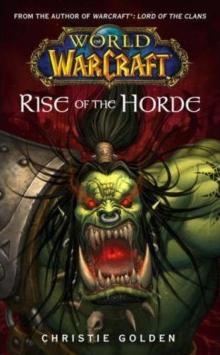 Rise of the Horde
Rise of the Horde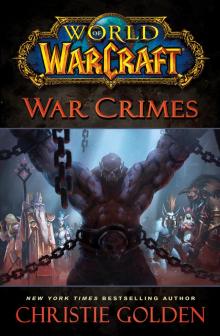 World of Warcraft: War Crimes
World of Warcraft: War Crimes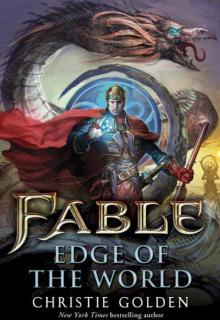 Fable: Edge of the World
Fable: Edge of the World Homecoming
Homecoming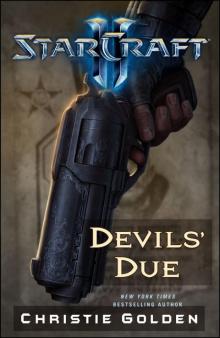 StarCraft II: Devil's Due
StarCraft II: Devil's Due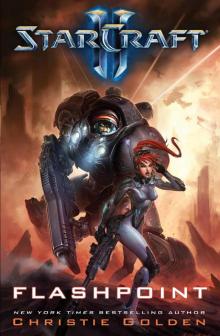 Starcraft II: Flashpoint
Starcraft II: Flashpoint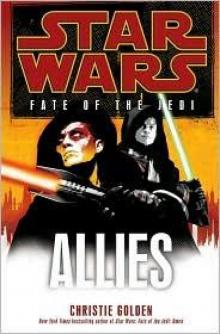 Allies
Allies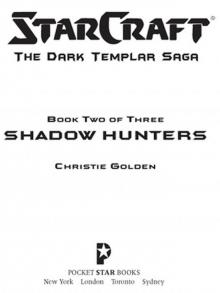 Shadow Hunters
Shadow Hunters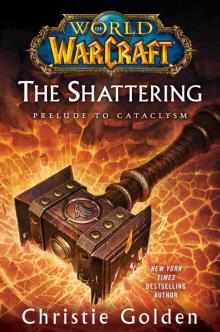 The Shattering: Prelude to Cataclysm wowct-1
The Shattering: Prelude to Cataclysm wowct-1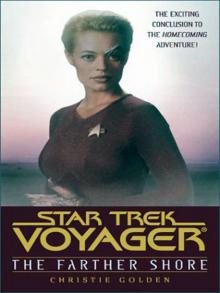 STAR TREK: VOY - Homecoming, Book Two - The Farther Shore
STAR TREK: VOY - Homecoming, Book Two - The Farther Shore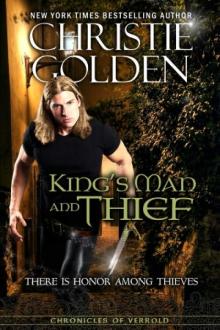 King's Man and Thief
King's Man and Thief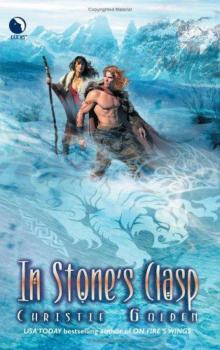 In Stone's Clasp
In Stone's Clasp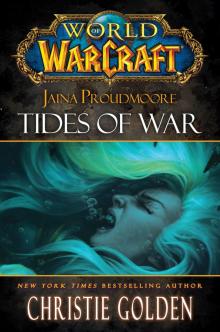 Jaina Proudmoore: Tides of War
Jaina Proudmoore: Tides of War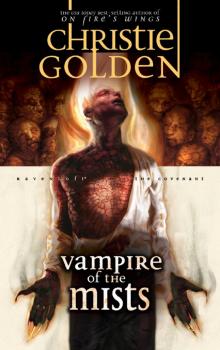 Vampire of the Mists
Vampire of the Mists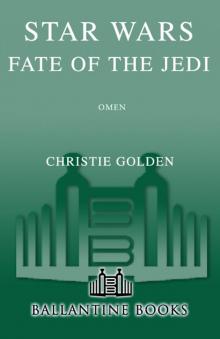 Star Wars: Fate of the Jedi II: Omen
Star Wars: Fate of the Jedi II: Omen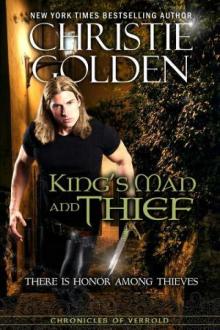 King's man and thief cov-2
King's man and thief cov-2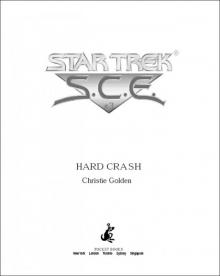 Star Trek
Star Trek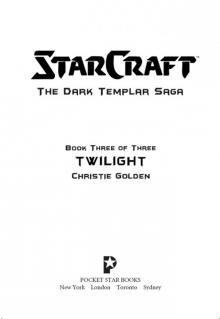 StarCraft: Dark Templar: Twilight
StarCraft: Dark Templar: Twilight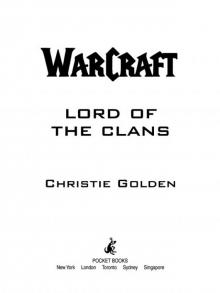 Lord Of The Clans
Lord Of The Clans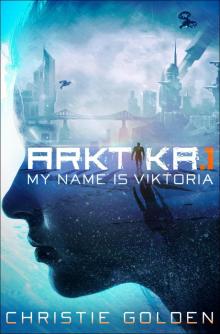 ARKTIKA.1 (Short Story)
ARKTIKA.1 (Short Story)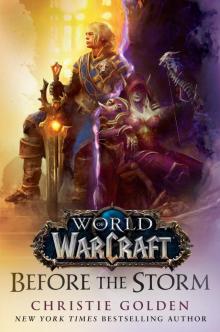 Before the Storm
Before the Storm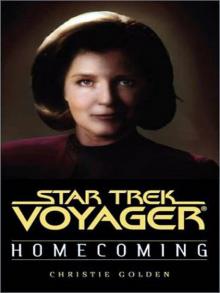 STAR TREK: VOY - Homecoming, Book One
STAR TREK: VOY - Homecoming, Book One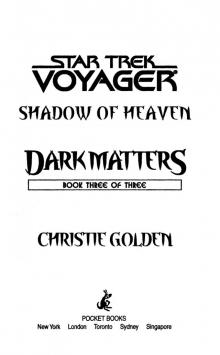 Shadow of Heaven
Shadow of Heaven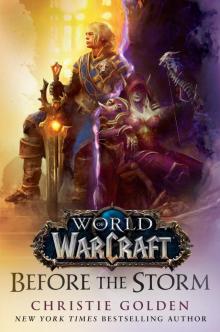 Before the Storm (World of Warcraft)
Before the Storm (World of Warcraft)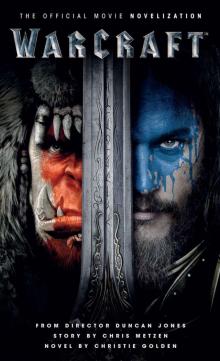 Warcraft Official Movie Novelization
Warcraft Official Movie Novelization Flashpoint
Flashpoint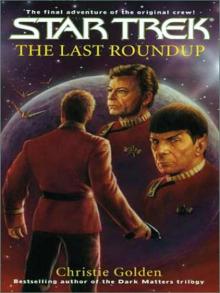 STAR TREK: The Original Series - The Last Roundup
STAR TREK: The Original Series - The Last Roundup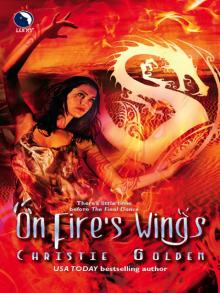 On Fire’s Wings
On Fire’s Wings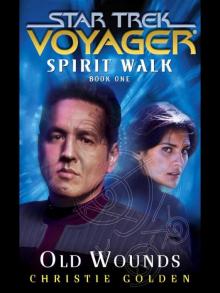 Spirit Walk, Book One
Spirit Walk, Book One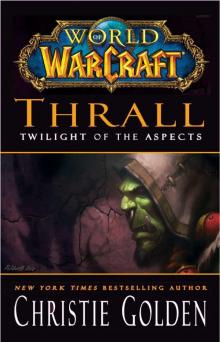 Thrall Twilight of the Aspects
Thrall Twilight of the Aspects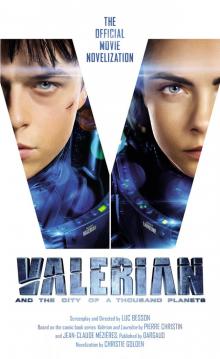 Valerian and the City of a Thousand Planets
Valerian and the City of a Thousand Planets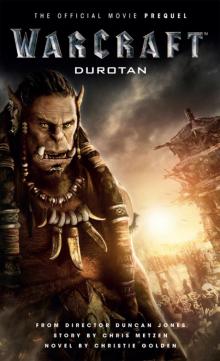 Warcraft
Warcraft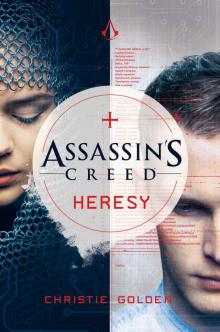 Assassin's Creed: Heresy
Assassin's Creed: Heresy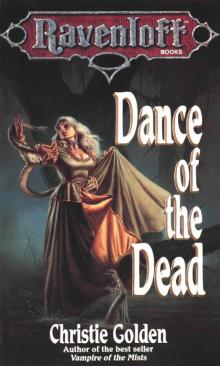 Dance of the Dead
Dance of the Dead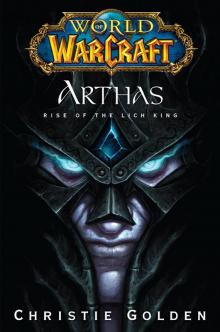 Arthas: Rise of the Lich King wow-6
Arthas: Rise of the Lich King wow-6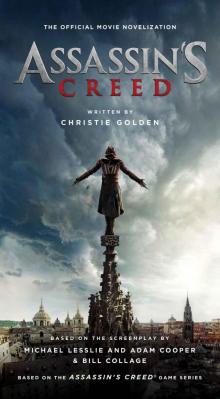 Assassin's Creed: The Official Movie Novelization
Assassin's Creed: The Official Movie Novelization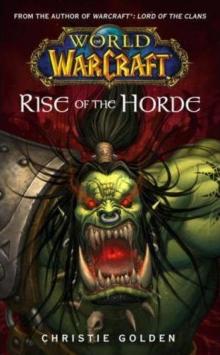 Rise of the Horde wow-2
Rise of the Horde wow-2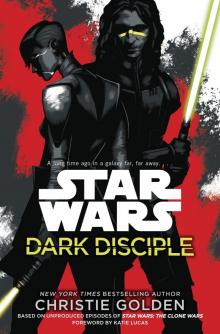 Dark Disciple
Dark Disciple Ghost Dance
Ghost Dance The Shattering
The Shattering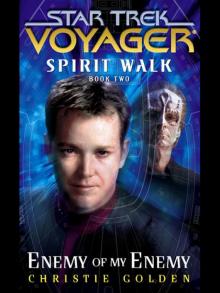 Spirit Walk, Book Two
Spirit Walk, Book Two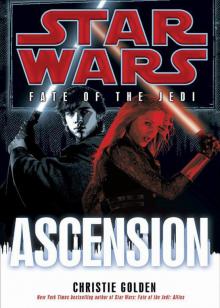 Star Wars: Fate of the Jedi: Ascension
Star Wars: Fate of the Jedi: Ascension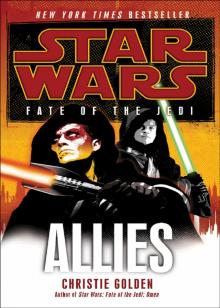 Star Wars: Fate of the Jedi V: Allies
Star Wars: Fate of the Jedi V: Allies The Enemy Within
The Enemy Within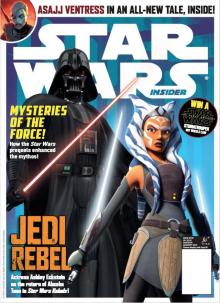 Kindred Spirits
Kindred Spirits The Farther Shore
The Farther Shore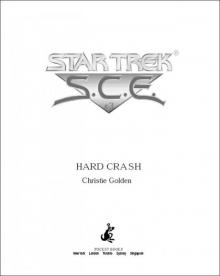 Star Trek: Hard Crash (Star Trek: Starfleet Corps of Engineers Book 3)
Star Trek: Hard Crash (Star Trek: Starfleet Corps of Engineers Book 3) Twilight
Twilight